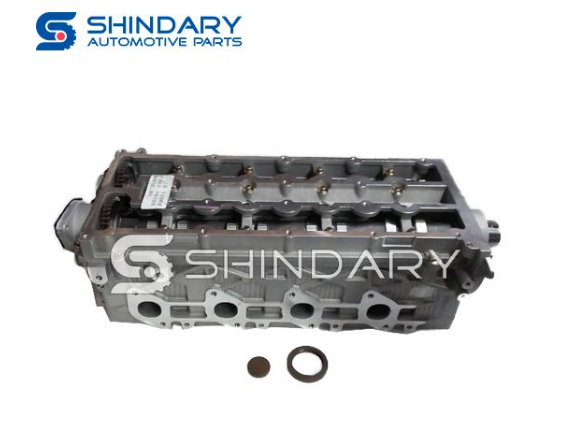Copyright © Shindary Automotive Parts Co., Ltd. All Rights Reserved
The engine is the heart of any vehicle, and the cylinder head plays a crucial role in ensuring its optimal function. While often overlooked by the average driver, the cylinder head is a complex component that contributes significantly to the performance and efficiency of an engine. Let's explore the functions of a cylinder head, unveiling the intricate operations that take place within this vital automotive part.
The cylinder head forms the upper ceiling of the combustion chamber above each of the pistons, together with the spark plug sockets, and injector holders. The intake and exhaust ducts hoses also converge in the cylinder head with associated valves, guides, and return springs.
The cylinder-head gasket is installed between the engine block and the cylinder head.
The cylinder head has the following tasks:
Sealing between the combustion chamber and cylinder block
Forming the shape of the combustion chamber
Dissipating the heat from the combustion process
It contains the most important mechanical components for controlling the gas exchange process. The following components are situated in the cylinder head:
Inlet and outlet ports of the cylinders
Valve control
Oil ducts for lubricating the valve train
Coolant ducts
Spark plugs (on petrol engines)
Injection valves (on petrol engines with direct injection)
Injection nozzles and glow plugs (on diesel engines)
Its construction design essentially influences the operating characteristics and performance of the engine.

At its core, the cylinder head serves as a cap for the engine's cylinders, sealing them tightly to contain the combustion process. The combustion chambers are where the fuel and air mixture ignites, generating the power needed to propel the vehicle. The cylinder head's role in maintaining a secure seal is essential for preventing leaks and ensuring optimal combustion efficiency.
One of the primary functions of the cylinder head is to house the intake and exhaust valves. These valves control the flow of fuel and air into the combustion chambers and the expulsion of exhaust gases after combustion. The cylinder head's design and construction are critical in facilitating the precise movement of these valves, ensuring that they open and close at the right times to synchronize with the engine's four-stroke cycle.
Intake Valves: Bringing in the Mix
The intake valves open to allow the entry of fuel and air into the combustion chambers. The cylinder head's design must optimize this process, promoting efficient mixing of the fuel and air for combustion.
Exhaust Valves: Expelling Waste Gases
Conversely, exhaust valves open to release the spent exhaust gases produced during combustion. The cylinder head plays a pivotal role in managing the smooth and timely expulsion of these gases to maintain engine efficiency.
Engines generate an immense amount of heat during operation, and efficient cooling is vital to prevent overheating and potential damage. The cylinder head incorporates coolant passages that allow the circulation of coolant to dissipate heat. This cooling mechanism is crucial for maintaining the engine's operating temperature within the optimal range, ensuring longevity and preventing thermal stress on engine components.
Coolant Passages: Managing Heat
The coolant passages in the cylinder head serve as conduits for the flow of coolant. As the coolant circulates, it absorbs heat from the engine, preventing excessive temperature buildup.
Thermal Expansion Control: Avoiding Stress
The cylinder head's design considers the thermal expansion of materials to prevent stress-induced damage. Proper cooling helps manage thermal expansion, maintaining the structural integrity of the cylinder head.
The cylinder head houses the spark plugs, which play a crucial role in igniting the fuel and air mixture within the combustion chambers. The spark plug's location within the cylinder head is strategic, ensuring optimal positioning for ignition and combustion efficiency.
Ignition Spark: Triggering Combustion
When the spark plug ignites, it creates a spark that ignites the compressed fuel and air mixture within the combustion chamber. The cylinder head's design ensures that the spark plug is appropriately positioned for consistent and efficient ignition.
The cylinder head provides support for the camshaft, a component responsible for controlling the opening and closing of the valves. The camshaft's interaction with the valves is crucial for maintaining the engine's timing and overall performance.
Camshaft Housing: Guiding Valve Movements
Integrated within the cylinder head, the camshaft relies on precision engineering to ensure the accurate operation of the valves. The camshaft's profile dictates the timing and duration of valve openings, influencing the engine's power and efficiency.
Understanding the multifaceted functions of a cylinder head sheds light on its critical role in the overall performance of an engine. Whether you are a mechanic in need of a replacement cylinder head or an automotive manufacturer seeking a reliable supplier for quality components, ensuring the optimal function of this vital part is paramount. If you have questions or require assistance in selecting the right cylinder head for your needs, feel free to contact us. As a trusted name in the automotive industry, we are here to provide guidance and solutions tailored to your specific requirements.
Shindary Automotive Parts Co., Ltd.